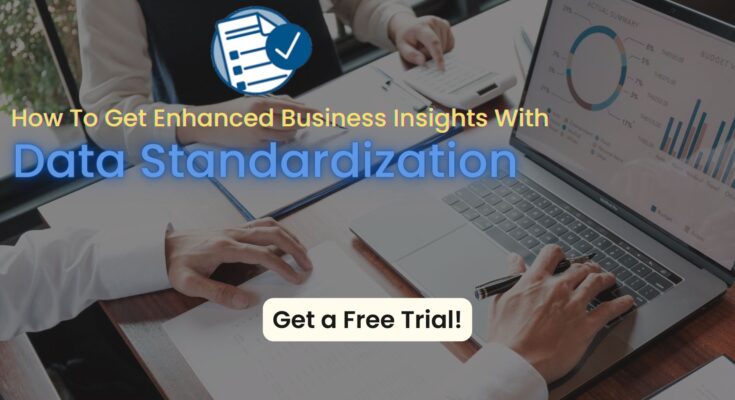Data is a crucial commodity, it is the driving force behind many business operations. Huge amount of data gets transacted on a daily basis amongst organizations and various stakeholders, that is later utilized for consumer operations. But, raw data is mismanaged, it needs further processing before being integrated for business needs.
Data standardization is the process of rearranging data with the goal of making it suitable for efficient interpretation, for extracting accurate and actionable insights from it later. Let’s find out how data standardization professionals can help us get useful business insights.
Importance of Data Standardization
People often confuse data cleansing with data standardization. It should be kept in mind that data cleansing is the process of improving data quality by removing/rectifying inaccurate information. Whereas data standardization is performed on the structure, by transforming data into a standard format. It is important as it increases the efficiency and potential of data.
Everyone using this data should have a common understanding, to utilize it in business operations. In case the data is unstandardized, it will lead to confusion among subsequent departments. They will end up wasting time in manually standardizing data to suit their operational requirements.
Data that is not converted into standard format is more of a burden than an asset. For instance, there is a library where some books are arranged according to the color, some as per the number of pages, and some according to cover style. In this scenario, is it easy for everyone to find relevant books?
Unstandardized data may lead to loss of time and money, in crucial marketing operations. Data standardization is important to:
- Streamline the flow of credible data
- Improve analytical results
- Create improved personalized consumer marketing initiatives
- Improve management of various business operations
- Gain access to market segments and improve leads
5 Tips For Perfect Data Standardization
Before beginning with data standardization you should audit your data and also mark your organization’s data goals. It will help you identify the discrepancies. There are many methods for data standardization, here are the 5 tips that will assist you in achieving better results:
➔ Analyze Your Requirements
To achieve perfect results in data standardization it is essential to identify your business’s needs from the process. Analyze why you are collecting data, who will be using this data, and whether it will help in improving your operations. Also, identify which data fields you need and why.
As you come up with a solution to these questions, it will clear your understanding of the type of data you need. It helps you in deciding on the form of data, assists you in creating relevant groups, and improves efficiency.
➔ Identify Data Entry Points
Businesses now have numerous sources of data. As most of the information exchange is happening digitally, data entry points are omnipresent. Present-day sources include – data-providing agencies, survey reports, cookies, web-browsing history, emailers, consumer and contact forms, etc.
Data standardization professionals would like to know your data sources and the frequency of receiving data. Also, some platforms and business intelligence tools store data differently, which could be a challenge to bifurcate later. Once the data standardization service provider knows the sources, identifying structure will help reduce repetition.
➔ Set Your Data Standards
Identify a standard template, suitable for the way you wish to collect and store data. This template can be chosen on the lines of your business’s data objectives. Experienced data standardization service provider can help you set your format standards as per the need. Say, for example, data is about contact details, you can choose format standards like using full company names or abbreviations, phone numbers will have area codes in brackets or with hyphens, etc.
➔ Perform Data Cleansing
Data standardization professionals perform cleansing before they begin the process. It is important to remove errors, duplicate entries, and missing information from data before it is standardized. There is no good in standardizing untidy data, as it will still lead to false analyses and a waste of resources.
➔ Use Data Automation
For a quick, error-free, and cost-effective normalization of large data sets, data automation software can be a great tool. Manually editing each data can be a daunting task in the case of large data sets. Automated tools will bifurcate the data into respective segments and store it automatically. They remove duplicate entries and create a focused database to be utilized for better consumer marketing.
The following methods for data standardization can be utilized:
- Common Formats is collecting data in a particular format, depending on its type.
- Pre-Set Standards is using predetermined standards for respective data.
- Z-Scores are obtained using the formula “Z= Value – Mean / Standard Deviation
Data Standardization Benefits For Your Business
Consistent and accurate data can be very advantageous for organizations. Its analysis can help you gain the marketing edge you desire. Some of the benefits of data standardization are as follows:
- It improves the productivity of an organization. Crucial business operations like marketing, verification, customer support and others may utilize accurate data values for focused working. For instance, inaccurate data will waste marketing initiatives like emailers.
- It reduces operational costs. Inaccurate data wastes time, money and human resources. Collecting and using free format data leads to many errors, leading to repetitive costs. Outsourcing data standardization will save this cost for you.
- It improves the decision making ability of businesses. Dirty, unstandardized data will result in misinterpretation, further leading to wrong analysis. However, data standardization professionals will be able to rectify its format for efficient analysis.
- Outsourcing data standardization improves business’s customer acquisition ability. Using accurate data for customer interaction will instill trust in them. They find the business credible to maintain a lasting bond. In a way, data standardization also helps in client-retention.
To Sum It Up
Hopefully, we have made it clear how unstandardized data risks your business operations and investment. It is evident how reliable and efficient data can be an asset for operations.
At the same time, depending on your business, you may not find it feasible to hire in-house data professionals. But, ignoring data usage and losing out on valuable business insights is not advisable as well. Instead of wasting time and money on bad data it would be smarter to outsource to data standardization services.
Author Bio
Gracie Ben is a data analyst currently working at DataEntryIndia.in, a leading company providing data entry & mining services & other data-related solutions. For more than ten years, she has actively contributed to the growth of many enterprises & businesses (startups, SMEs, and big companies) by guiding them to utilize their data assets.
Having a keen interest in data science, Gracie keeps herself up-to-date on all the latest data trends and technologies shaping the industry and transforming businesses. She has written over 1600 articles and informative blogs so far covering various topics, including data entry, data management, data mining, web research, and more.




